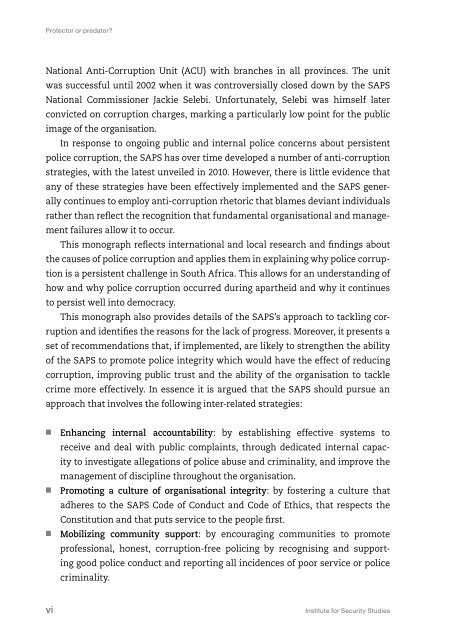Protector or predator? - Institute for Security Studies
Protector or predator? - Institute for Security Studies
Protector or predator? - Institute for Security Studies
You also want an ePaper? Increase the reach of your titles
YUMPU automatically turns print PDFs into web optimized ePapers that Google loves.
<strong>Protect<strong>or</strong></strong> <strong>or</strong> predat<strong>or</strong>?<br />
National Anti-C<strong>or</strong>ruption Unit (ACU) with branches in all provinces. The unit<br />
was successful until 2002 when it was controversially closed down by the SAPS<br />
National Commissioner Jackie Selebi. Unf<strong>or</strong>tunately, Selebi was himself later<br />
convicted on c<strong>or</strong>ruption charges, marking a particularly low point f<strong>or</strong> the public<br />
image of the <strong>or</strong>ganisation.<br />
In response to ongoing public and internal police concerns about persistent<br />
police c<strong>or</strong>ruption, the SAPS has over time developed a number of anti-c<strong>or</strong>ruption<br />
strategies, with the latest unveiled in 2010. However, there is little evidence that<br />
any of these strategies have been effectively implemented and the SAPS generally<br />
continues to employ anti-c<strong>or</strong>ruption rhet<strong>or</strong>ic that blames deviant individuals<br />
rather than reflect the recognition that fundamental <strong>or</strong>ganisational and management<br />
failures allow it to occur.<br />
This monograph reflects international and local research and findings about<br />
the causes of police c<strong>or</strong>ruption and applies them in explaining why police c<strong>or</strong>ruption<br />
is a persistent challenge in South Africa. This allows f<strong>or</strong> an understanding of<br />
how and why police c<strong>or</strong>ruption occurred during apartheid and why it continues<br />
to persist well into democracy.<br />
This monograph also provides details of the SAPS’s approach to tackling c<strong>or</strong>ruption<br />
and identifies the reasons f<strong>or</strong> the lack of progress. M<strong>or</strong>eover, it presents a<br />
set of recommendations that, if implemented, are likely to strengthen the ability<br />
of the SAPS to promote police integrity which would have the effect of reducing<br />
c<strong>or</strong>ruption, improving public trust and the ability of the <strong>or</strong>ganisation to tackle<br />
crime m<strong>or</strong>e effectively. In essence it is argued that the SAPS should pursue an<br />
approach that involves the following inter-related strategies:<br />
■■<br />
■■<br />
■■<br />
Enhancing internal accountability: by establishing effective systems to<br />
receive and deal with public complaints, through dedicated internal capacity<br />
to investigate allegations of police abuse and criminality, and improve the<br />
management of discipline throughout the <strong>or</strong>ganisation.<br />
Promoting a culture of <strong>or</strong>ganisational integrity: by fostering a culture that<br />
adheres to the SAPS Code of Conduct and Code of Ethics, that respects the<br />
Constitution and that puts service to the people first.<br />
Mobilizing community supp<strong>or</strong>t: by encouraging communities to promote<br />
professional, honest, c<strong>or</strong>ruption-free policing by recognising and supp<strong>or</strong>ting<br />
good police conduct and rep<strong>or</strong>ting all incidences of po<strong>or</strong> service <strong>or</strong> police<br />
criminality.<br />
vi<br />
<strong>Institute</strong> f<strong>or</strong> <strong>Security</strong> <strong>Studies</strong>

















